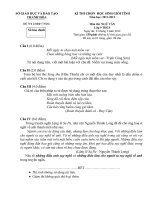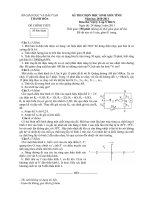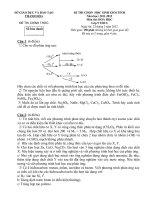Tải Đề thi học sinh giỏi lớp 9 THCS tỉnh Hà Nam năm 2011 - 2012 môn Tiếng Anh - Sở GD-ĐT Hà Nam
Bạn đang xem bản rút gọn của tài liệu. Xem và tải ngay bản đầy đủ của tài liệu tại đây (154.06 KB, 5 trang )
<span class='text_page_counter'>(1)</span><div class='page_container' data-page=1>
<b>HÀ NAM</b>
<b>ĐỀ THI CHÍNH THỨC</b>
<b>LỚP 9 THCS NĂM 2011</b>
<b>Môn: TIẾNG ANH</b>
Thời gian: 150 phút (không kể thời gian giao đề)
Đề thi gồm 05 trang; Thí sinh làm bài ngay vào bộ đề thi này
Điểm của bài thi
Họ tên, ch÷ ký cđa ngêi chÊm thi sè 1:
B»ng sè:
Hä tên, chữ ký của ngời chấm thi số 2:
Bằng chữ:
sè ph¸ch
<b>Question I: (3.0 points) Choose the word or phrase (A, B, C or D) that best fits the blank space in</b>
<b>each sentence. </b>
1.We had better _______ an umbrella when we go out. It looks like it's going to rain.
A. taken
B. took
C. takes
D. take
2. We spent an enjoyable evening talking about old time.
A. pleasant
B. boring
C. comfortable
D. free
3. Tom read this article on the website, ________ ?
A. doesn't he
B. didn't he
C. did he
D. hasn't he
4. I hope that the weather will improve . _______ we'll have to cancel the picnic.
A. However
B. Although
C. Therefore
D. Otherwise
5. Not only _______ , but he also plays the piano and writes his own songs.
A. does Billy Joel sing
B. Billy Joel sings
C. if Billy Joel sings
D. what Billy Joel sings
6. Jeans have never been ______ fashion, and today young generation is still fond ______
wearing them.
A. out of ...of B. out of... in
C. about ... on
D. with ... of
7. Don't promise _______ it if you aren't sure you can.
A. doing
B. to do
C. will do
D. being done
8. Are all the students used ______ their summer vacation in the countryside?
A. to spend
B. spend
C. to spending
D. spending
9. If we don't ______ on electricity, there will be power cut.
A. economic
B. economics
C. economical
D. economize
10. I saw many soldiers and tanks ______ were moving to the front.
A. which
B. that
C. whom
D. who
11. Tidal wave and _____ which happened in Japan last month were natural disasters
.
A. snowstorm
B. volcano
C. earthquake
D. typhoon
12. When we heard the unexpected news, we were at a loss of words.
A. could not speak for a while
B. did not know what to say
C. became dumb
D. panicked
13. " ________ the T.V for me, will you? I want to watch the weather forecast".
A. Turn on
B. Turn down
C. Turn into
D. Turn off
14. ______ is a row of things forming a fence.
A. Garbage
B. Hedge
C. Dump
D. Trash
</div>
<span class='text_page_counter'>(2)</span><div class='page_container' data-page=2>
<b>Your answer:</b>
1
2
3
4
5
6
7
8
9
10
11
12
13
14
15
<b>Question II: (2.0 points) Complete the sentences ( or exchanges) by supplying the correct form of the</b>
<b>verbs in brackets . </b>
<b>a. A: What part of Birmingham (1. you / live) when you were a student?</b>
B: A place called Selly Oak. (2. you ever be) there?
<b>b. When I got home, Bill (3. lie) on the sofa. The television was on, but he was not</b>
watching it. He (4. fall) asleep and (5. snore) loudly. I turned the television off and just
then he (6. wake) up.
<b>c. Mary said that she (7. learn) French for five years.</b>
<b>d. Would you mind (8. tell) your children (9. keep) quiet for a moment? I (10. try) to</b>
finish my report.
<b>Your answer:</b>
<b>1</b>
<b>.</b>...<b>2.</b>
...<b>3</b>
.
<sub>...</sub><b>4</b>
.
<sub>...</sub><b>5</b>
...<b><sub>6</sub></b>
.
<sub>...</sub><b><sub>7</sub></b>
.
<sub>...</sub><b><sub>8</sub></b>
.
<sub>...</sub><b>9</b>
.
...<b>10</b>
.
...<b>Question III: (2.0 points) Use the correct form of the words in the brackets to complete the following</b>
<b>passage/ sentences. </b>
<b>a. The advantage of living in the countryside is that the air is (1-</b>
<b>pollute</b>
).
<b>b. The Lunar New Year holiday is one of the most important (2-</b>
<b>celebrate</b>
) for
Vietnamese people.
<b>c. I always wanted to be a great (3-</b>
<b>science</b>
). I had these dreams of discovering a
revolutionary new drug that would save the lives of hundreds of people. (4-
<b>fortunate</b>
) ,
I was never very good at (5-
<b>chemist</b>
) at school.
After a while, I decided I would become an (6-
<b>invent</b>
) and designed an amazing new
(7-
<b>produce</b>
) which would become a household name. My parents were quite
encouraging, but told me to be a little more (8-
<b>practice</b>
) and not so (9-
<b>ambition</b>
) . A
few weeks later, I had a brilliant idea for a pen that would write upside down. To my
(10-
<b>disappoint</b>
), a friend of mine pointed out that it was not a new discovery .
<b>Your answer:</b>
<b>1</b>
...<b>2</b>
...<b>3</b>
<b>.</b>...<b>4</b>
...<b>5</b>
...<b>6</b>
...<b>7</b>
...<b>8</b>
<b>.</b>...<b>9</b>
...<b>10</b>
<b>.</b>...<b>Question IV: ( 2.0 points ) Read the text below. Some of the lines are correct and some have a</b>
<b>word which is incorrect. If a line is correct, put a tick (</b>
<sub></sub>
<b>). If the line has an incorrect word,</b>
<b>underline and correct it. </b>
</div>
<span class='text_page_counter'>(3)</span><div class='page_container' data-page=3>
generally have little free time than men, because they spend time
2 ...
on domestic work, shopping and childcare.
3 ...
Surveys showed that more men read newspapers than
4 ...
woman, and a slightly higher proportion of adults read Sunday
5 ...
newspapers than read day morning national newspapers.
6 ...
More people are take holidays abroad nowadays. By 1971, only
7 ...
36 per cent of adults in Britain had been abroad in holiday but,
8 ...
by 1983 this proportion had risen to 62 per cent, nearly
9 ...
fifteen millions people.
10 ...
<b>Question V: (2.0 points) Fill in each numbered blank in the passage with one most suitable word. </b>
Rivers are ___1___ of the world's most important natural resources. Many cities are
on large rivers, and almost every country has ___2__ least one river that __3__ an
important part in the lives of its people.
Besides transportation, rivers ___4___ food, water for crops, water to drink, and
opportunities for recreation for people who live along their ___5___ . And in order to get
water for crops, engineers build a dam ___6___ a river and let the water become a lake
___7___ the dam. Then people can use their ____8___ not only to irrigrate fields but also
to make electricity for homes and industries.
However, the water often becomes polluted when cities on river bank grow in size
and the number ___9___ industries increases. We are learning that it is necessary to
__10____ river clean if we want to enjoy the benefits of the natural resources.
<b>Your answer:</b>
<b>1</b>
...<b>2</b>
...<b>3</b>
...<b>4</b>
...<b>5</b>
...<b>6</b>
...<b>7</b>
...<b>8</b>
...<b>9</b>
...<b>10</b>
...<b>Question VI: (2.0 points) Read the text and decide which option A, B, C or D best fits each</b>
<b>numbered blank. </b>
About twenty per cent of the world's present energy already (1) ... from the sun
in one form or another. Special devices have already been made (2) ... to place on the
roofs of houses and flats to (3) ...the sun's rays. Thousands of these devices are now
being used to provide (4) ...in homes throughout the United States. (5) ... more than
a million solar (6) ... units have already been built in home in Japan. Other purposes
(7) ... which solar energy is at present being used include the (8) ... of salt from
seawater, irrigation and sewage disposal.
For most people in developing countries, the (9) ...is not for airconditioners or
central heating (10) ... for cheap ways of cooking food, drying crops and lighting homes.
1. A. goes
B. comes
C. makes
D. supplies
2. A. difficult
B. effective
C. available
D. valuable
3. A. collect
B. store
C. give off
D. produce
4. A. electricity
B. source
C. fuel
D. power
5. A. where
B. when
C. while
D. which
6. A. water-heat
B. water-heating
C. heat-water
D. heat-watering
7. A. for
B. at
C. from
D. by
8. A. relation
B. production
C. provision
D. separation
9. A. supply
B.lack
C. need
D. response
</div>
<span class='text_page_counter'>(4)</span><div class='page_container' data-page=4>
<b>Your answer:</b>
<b>1</b>
<b>2</b>
<b>3</b>
<b>4</b>
<b>5</b>
<b>6</b>
<b>7</b>
<b>8</b>
<b>9</b>
<b>10</b>
<b>Question VII: (2.0 points) Read the following passage and mark the letter A, B, C, or D to indicate</b>
<b>the best answer to each of the following questions. </b>
My village is generally called Langde which consists of Upper Langde and Lower
Langde. My own village is in Upper Langde, 32 km away from Kaili city and 17 km away
from Leishan Country. My hometown is located at the foot of a scenic mountain with a
murmuring crystal clear river in front. Groups of waterwheels by the river side produce
beautiful folk songs day and night.
My father says that we have a festival every thirteen years and the festival runs for
three consecutive years. People don’t kill fattened pigs during the first and second years but
only in the final year. So the most special year is the last one,
<b>namely</b>
the 13
th<sub> year. As you</sub>
can imagine, it is not easy to see many in one lifetime. I can’t remember what the last one,
13 years ago, was like. Fortunately my village held the festival from 22
nd<sub> February to 2</sub>
ndMarch 2009 and the one this year was a very spectacular one.
1/ The writer’s village is ...
A. in Upper Langde C. 32 km away from Leishan Country
B. in Lower Langde D. 17 km away from Kaili city
2/ What is not mentioned in the description of the author’s hometown ?
A. Waterwheels produce beautiful folk songs C. You can go there on foot
B. It is near a river D. It is near a mountain
3/ When are the fattened pigs killed ?
A. Every thirteen years of the festival C. During the second year of the festival
B. During the first year of the festival D. In the final year of the festival
4/ The word “
<b>namely</b>
” can be best replaced by ...
A. such as B. that is
C. like D. for example
5/ When will the next festival be held ?
A. in 2010 B. in 2011 C. in 2012 D. in 2022
<b>Your answer:</b>
<b>1</b>
<b>2</b>
<b>3</b>
<b>4</b>
<b>5</b>
<b>Question VIII: (2.0 points) Rewrite each sentence, beginning as shown, so that the meaning stays the same. </b>
1. What a pity my wife can't speak English.
<i><b> I wish</b></i>
...2. The man called the police. His wallet was stolen.
<i><b> The man</b></i>
...3. English people speak very quickly. That's why I can't understand them.
<i><b> If</b></i>
...4. The last time we saw Peter was on Sunday.
<i><b> We haven't</b></i>
...5. This city had old buildings, but none can be found nowadays.
<i><b> There used</b></i>
...6. Turn off all the lights before going out.
<i><b> All the lights must</b></i>
...7. I would prefer you to deliver the sofa on Saturday.
</div>
<span class='text_page_counter'>(5)</span><div class='page_container' data-page=5>
<i><b> My father told me</b></i>
...9. Somebody repaired her refrigerator last month.
<i><b> She</b></i>
...10. The novel was so interesting that I read it many times.
<i><b> It was</b></i>
...<b>Question IX: (3.0 points) Write a passage about 100 - 150 words about the topic: </b>
Learning english as a foreign language
- The importance of learning English nowadays.
- How to learn English well.
...
...
...
...
...
...
...
...
...
...
...
...
...
...
...
...
...
...
<i><b> </b></i>
<i><b> </b></i>
</div>
<!--links-->









